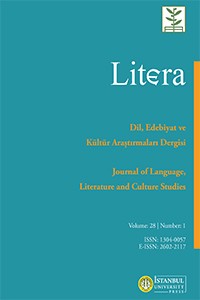Öz
In the field of foreign language education, textbooks continue to be one of the most important support materials for language teachers. Foreign language teaching methods are updated according to the requirements and needs that continuously arise over time. Authors of textbooks update their materials by following these innovations. In the “foreword” section of each book, you can normally find the general aims of the book, its target public, methodologies and materials that are at the disposal of students, and their intended learning outcomes, and the methodology and materials that are at the teachers’ disposal. In this study, we aim to reveal hidden discourses in the “foreword” sections of textbooks. When these sections are considered as texts, they can be regarded as informative pieces of writing that inform their readers about the overall purpose of writing a book, about the actual book that they refer to, and about the overall characteristics of the subject area. Consequently, in this research, we attempt to first classify various types of text. Second, we aim to clarify what types of “foreword” sections can in effect be examined. And finally, we analyze the linguistic deviations and masked discourses that were found in the structures of these text. Altogether, we examined 13 French textbooks—ranging from level 1 to teens and adults—to offer a wide range of examples in this important research field. We believe that this work is particularly useful for those French teachers who are in the position of making the choice for their schools’ future textbooks based on the “foreword” sections of these books.
Anahtar Kelimeler
Language textbooks foreword objectivity subjectivity discourse discourse
Kaynakça
- Bachmann, C. Lindenfeld, J., & Simonin, C. (1981). Langage et communications sociales. Paris, FR: Hatier.
- Bernicot, J., & Bert-Erboul, A. (2014). L’acquisition du langage par l’enfant. Paris, FR: In Press Editions.
- Kerbrat-Orecchioni, C. (1997). L’énonciation. Paris, FR: Armand Colin.
Öz
Dans le domaine de la didactique des langues étrangères, les manuels de langues gardent toujours leur place primordiale comme supports pour les enseignants. Les méthodologies se renouvellent selon les nécessités et les besoins. Selon ces renouvellements, les auteurs des manuels renouvellent leurs ouvrages. Du côté des enseignants, le choix de manuels demeure un problème épineux, car ils se trouvent souvent face à un large éventail de manuels qui leur promet un apprentissage « efficace » de langue. Quand il s’agit des avant-propos des manuels scolaires, la fonction conative entre en scène en raison du caractère central du public visé. Ce qui est prédominant dans ces textes, ce n’est pas seulement qu’ils s’appuient sur la fonction référentielle, et informative mais aussi par leur souci de vente où on rencontre plutôt la fonction conative et la volonté de convaincre le public visé. On peut préciser ces structures langagières dans ces textes, qu’elles soient implicites, ou explicites. Partant de cela, dans notre étude, nous allons classifier et analyser ces types de textes, puis nous essaierons de préciser leurs groupes. Ensuite nous tenterons de faire apparaître les écarts langagiers qui se situent dans la structure profonde de ces textes. Nous allons préciser la subjectivité dans les avant-propos des 13 manuels de français langue étrangère (du niveau A1 concernant les adolescents et les adultes) en classifiant les adjectifs, les substantifs et les adverbes utilisés dans ces textes. Nous suggérons que cette étude va être utile pour les enseignants du français.
Anahtar Kelimeler
Manuel de langue avant-propos objectivité subjectivité discours
Kaynakça
- Bachmann, C. Lindenfeld, J., & Simonin, C. (1981). Langage et communications sociales. Paris, FR: Hatier.
- Bernicot, J., & Bert-Erboul, A. (2014). L’acquisition du langage par l’enfant. Paris, FR: In Press Editions.
- Kerbrat-Orecchioni, C. (1997). L’énonciation. Paris, FR: Armand Colin.
Öz
Kaynakça
- Bachmann, C. Lindenfeld, J., & Simonin, C. (1981). Langage et communications sociales. Paris, FR: Hatier.
- Bernicot, J., & Bert-Erboul, A. (2014). L’acquisition du langage par l’enfant. Paris, FR: In Press Editions.
- Kerbrat-Orecchioni, C. (1997). L’énonciation. Paris, FR: Armand Colin.
Ayrıntılar
| Birincil Dil | İngilizce |
|---|---|
| Konular | Dilbilim |
| Bölüm | Araştırma Makaleleri |
| Yazarlar | |
| Yayımlanma Tarihi | 22 Haziran 2018 |
| Gönderilme Tarihi | 30 Kasım 2017 |
| Yayımlandığı Sayı | Yıl 2018 Cilt: 28 Sayı: 1 |


